A Dream in Debt: The High Price of Working in Japan for Vietnamese Youth
Lê Nam Phong wrote this article in Vietnamese, published in Luật Khoa Magazine on January 25, 2024. Japan Faces a

Tran Duy – Ha Anh
On the morning of April 19, 2008, indigenous villagers of Ia Piar – more than 80 km away from the Gia Lai provincial capital in Pleiku – were heading to their commune people’s committee with well prepared posters and banners calling for religious freedom and the protection of land ownership. They had their own “battle plan” ready, but so did the authorities.
Soon after the protest began, the villagers, who are Protestants, ran into a group of strangers carrying wooden sticks in their hands. For no reason, the protesters were severely threatened and beaten by these people. To save their lives, the villagers ran off in different directions, except for Nay Them, who was arrested despite not having joined the protest.
Nay Them recalls how the meeting room of the district police, where he was first interrogated, soon turned into a “slaughterhouse”. The police tied him to a chair with electric wires. He was tied so tightly he could barely move, not even a centimeter.
As if in a Hollywood movie, policemen kept walking around Nay while his whole body was shaking violently after being kicked, slapped, and beaten with batons that directly struck his head. Being shaken up after falling down from the chair, he was beaten over and over again. The people who hit him no longer considered him as one of their compatriots.
There was no attempt to talk to him nicely or to reason with him. Or maybe it was simply because this tactic is not used for ethnic Jrai people such as Nay. He had no rights at all, not even the right to talk, or to even open his mouth.
The police insisted that Nay knew exactly where the protestors were hiding. They kept beating him over and again with their hands and a baton. “ Soldiers, plainclothes policemen, mobile policemen and even traffic policemen were enjoying beating me up”, said Nay. “One of them walked around me and finally hit my face with a baton”. Blood splattered from his swollen nose and eyes until Nay fainted.
The next day, Nay woke up at a detention center with wounds all over his body. “I was in so much pain my eyes were swollen”, he recalls. “I could sit but could not open my eyes. I could not eat for five days”.
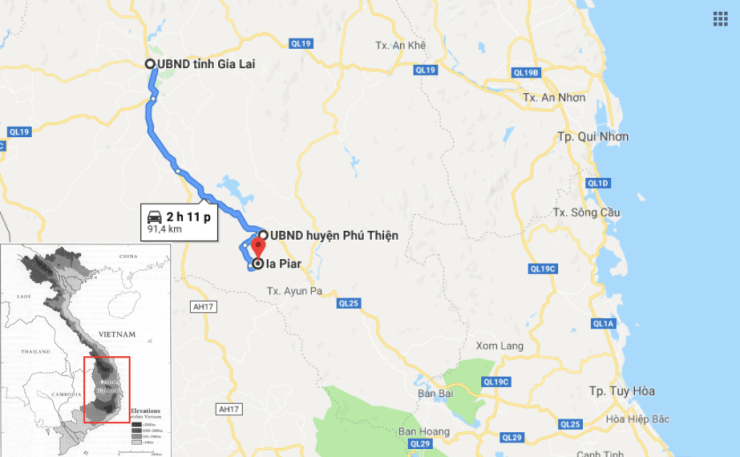
Meanwhile, Nay’s brother-in-law, Siu Wiu, the person in charge of the protest, was hiding far away deep in the forest. Siu was a small, muscular Jrai, a typical example of the dark-skinned Montagnards in the Central Highlands. His eyes were as sharp as a cat’s.
Every policeman in this district knew Siu Wiu. He had been sent to a re-education camp in 2004 under the charge of leading a demonstration. At the camp, Siu met 180 other Jrai people who were exploited while being held prisoner. They worked as sugar cane porters or builders from early morning until evening . “Everyone was beaten by hoe handles no matter who they were – young or senior citizens,” Nay said.
“We were arrested not for burglary, but for fighting for land protection and religious freedom”, he said. “Do you know if treating us like this is right or wrong?” Siu recalled asking one officer at the camp.
Two years later, he was set free, the re-education camp having failed to change Siu’s thinking about the government.The camp gave him 160,000 dong, which was just enough to buy a bus ticket home, leaving him without any money to buy anything to eat on his way back to his village.
Meanwhile, Siu’s family members – all Protestants – continued to be targeted because they had taken part in the protests. Some had been detained, arrested or imprisoned.
Siu Wiu was under house arrest while his father, Nay Bro, was imprisoned. “I was not allowed to do anything, and our land was also taken by the government,” Siu said. He added that the government had take three-quarters of his land, leaving just a little than 250 square meter left for farming.
Facing such difficulties, he called for a protest in front of the people’s committee of the Ia Piar commune. Other villagers joined Siu in the protest.
“In order to convince the villagers to join this protest, I talked about the truth. They also lost their land so they followed me”, said Siu. “Their beliefs were threatened by the government. Their family members had been sent to prison for religious reasons. The government said that we were free to exchange information, free to communicate. But in fact, we would be arrested whenever we raised our voices.”
Protests such as this were not uncommon in the Central Highlands of Vietnam. From 2001 to 2008, demonstrations have taken place frequently in the area and thousands of people have fled to Cambodia to escape the government’s revenge.
One month hiding in the forest was too much for Siu Wiu. He decided to go home to look for more food, but he was detained immediately. “I was arrested at around 4 pm and severely tortured,” he said. “They tied my legs to the chair with a hammock string and started to beat me until my mouth was swollen, my eyes could not open properly, and my ears were full of blood”.
Siu was sentenced to 10 years in prison at the end of December 2008.
Nay Them, who was released right after they caught Siu, never forgot what the policeman told him: “I understand that you don’t know about the protest, but as I was afraid that you would hide some information, I had to beat you first”.
The experiences of Nay Them, Nay Bro and Siu Wiu show how the Central Highlands of Vietnam is like a large prison for ethnic people who fight for their religious freedom and land rights. The more remote their villages are, the more controlling the local governments are. No law exists in these far-flung regions.
No lawyers dared to defend them. In addition to being a warning to villagers of the high cost of joining protests, the mobile trials were also a government ruse to make it appear that those charged had been given a fair trial. The trials were a sham. And even when left prison after serving their time, they’d still never be free people.
Nay Bro had been sentenced to seven years in prison for sabotaging the great unity policy after being accused of organizing protests in 2005. At the detention center, he was imprisoned with 62 other Jrai, Ede and Bana people for their work on behalf of land rights and religious freedom.
After being released from prison, the local police kept an eye on him as he remained a suspect in the plotting of protests.
“On August 25, 2015, the police came to arrest me again,” said Nay Bro. “They came to my house while I was looking for bamboo shoots in the forest. When I headed back home, my wife informed me that there were 5-6 policemen visiting my house. They asked her to keep me in my house as they wanted to see me the next day. I would rather die in the forest than be put under communist surveillance”.
Nay Bro took his personal belongings and informed his daughter that he and his wife would be away for a few days to take care of some friends in the hospital. Nay and his wife hid in the forest for more than 11 days.
As a highlander, Nay Bro didn’t believe what lowlanders often said: “If you didn’t do anything wrong, the police would set you free.” From his own experience, he knew that “once I was imprisoned for the first time, I would have no chance to go home after the second time I was imprisoned”.
In September 2015, Nay Them helped his parents-in-law travel to Saigon, where they then followed a stranger travelling by bus to Thailand. Crossing the border was the only way to avoid being arrested by the government and sent back to a reform camp or prison. Thailand was the favorite place for Montagnard refugees seeking to escape Vietnam.
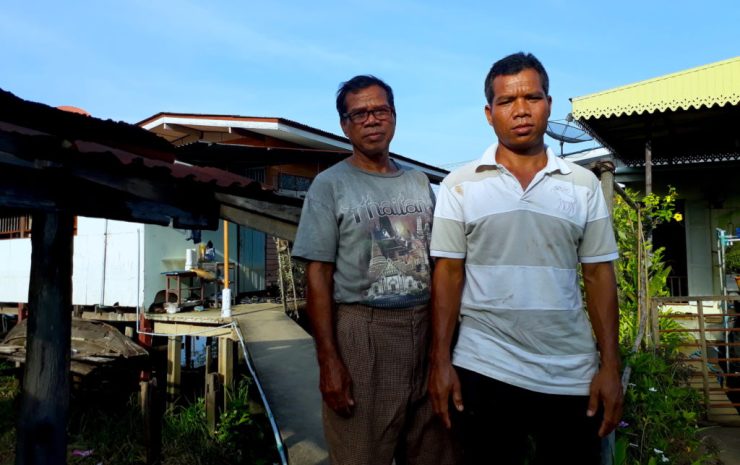
The word Montagnard was first used by the French when they ruled Vietnam to refer to the more than 20 different ethnic groups indigenous to the Central Highlands. These indigenous peoples lived in the Central Highlands before the Kinh, or Vietnamese, people arrived. The E-de, Jrai and Bana people have a larger population than other ethnic groups, such as the K’ho, Sedang, Stieng, and Ma.
Today, the word Montagnard has disappeared from official state usage,. They are now generally known as “ethnic minority people”.
Them was arrested in November 2016 after the police discovered that he was involved in helping his parents-in-law escape across the border to Thailand. He was in a dilemma between asking his in-laws to return to Vietnam and being prosecuted on the charge of “forcing others to flee or stay abroad illegally”, which carried a punishment of at least two years in prison.
Once again, crossing the border was the only way that Nay Them could think of to get out of his predicament. He took his wife, two children and his wife’s younger brother to Thailand with him after having been temporarily released. The arrest warrant was issued immediately after they left.
In the middle of July 2019, I met Nay Them and his wife’s other eight family members at a refugee camp in a suburb of Bangkok. They lived not far from the WestGate Shopping Mall, in the Bang Dai District, Nonthaburi Province. Siu Wiu came to Bangkok in 2018 after finishing his 10-year prison term.
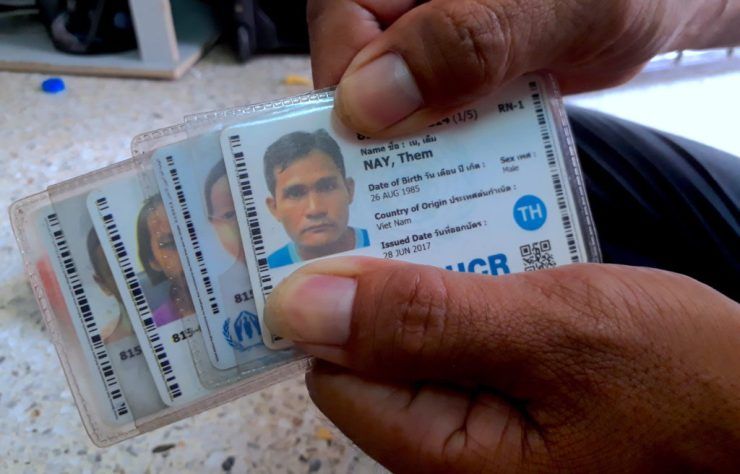
That day, Nay Them looked exhausted and frustrated. With a big paper board hanging in front of his chest, he and his two year old daughter, who was born in Thailand, wandered around different NGO offices, such as the United Nations High Commissioner for Refugees (UNHCR), begging for help for his wife, who had been detained for over a year.
Sen Nhiang, a Jrai person who took me to the camp from the MRT station, said “Although living in poor conditions here, I can follow my Protestantism freely. In the worst case, even if I’m arrested, I would not be beaten as the Vietnamese police did to me”.
Together with his wife and three other children, Sen lived in a 20 square meter room. There were no chairs or tables. A thin mattress lay in a corner, and the only other objects were an electric fan, clothes, books, a gas cooker, and an empty fridge; a Christian crucifix was placed solemnly in another corner of the room. His three children spoke Jrai and Thai much better than Vietnamese. His wife was sitting in front of their house weaving a towel for overseas Vietnamese who donated rice for her community. For almost a year, Sen had no job, as was the case with other refugees living here. His 14-year old daughter had just broken her arm and he was looking for support to continue her treatment.
Talking about the status of the Montagnards in Thailand, Grace Bui, a retired US attorney, said that this area is now home to over 500 Montagnards, with approximately 120 children. “Thailand did not sign the United Nations Convention in 1951 on the status of refugees, so Montagnards, despite being recognized as refugees by the UNHCR, are still illegal residents,” she said. “They are not allowed to work, and police can arrest and punish them very harshly.” ”
Grace has been voluntarily working in the camp over the last four years. She works with overseas Vietnamese to obtain rice donations. Grace asks the INGOs, UNHCR for support for the most needy cases, especially when someone is arrested.
Y Rin Kpa, an Ede ethnic man from the Central Highlands, who had been in prison for 10 years for taking part in protests, messaged me via Facebook from a refugee camp in Cambodia. He told me that he was in a camp in Phnom Penh with 27 other Montagnards, including seven children under 14.
He reported that Cambodian police were strictly surveilling these people. They lived with very limited subsidies and supplies funded by the UNHCR every month. However, their biggest fear wasn’t living under such a demanding situation, but of being deported back to Vietnam, where they could face imprisonment and other abuses. A family of three was forced to go back to Vietnam in June 2019.
Evan Jones, a coordinator for Asia Pacific Refugee Rights Network, a non-governmental organization that advocates for refugees in the Asia Pacific region, explained why these people don’t want to return to Vietnam.
“Vietnam is well-known for punishing returnees with prison sentences, harassment, physical abuse and intimidation,” she said. “It has been particularly difficult to keep in contact with Montagnards who have been forcibly returned in the past. This may suggest that they have faced reprisals from the Vietnamese authorities after their return.”
The Criminal Law issued in 2015 includes four articles for prosecuting people for illegal border crossings. The shortest prison sentence is one year (Article 349) if charged with organizing or brokering illegal emigration. The law stipulates up to 20 years in prison for particularly serious cases as stated in Article 121, which covers illegal emigration for the purpose of opposing the people’s administration.
Phil Robertson, deputy director of the Asian Division for Human Rights Watch, has been observing the human rights situation in the Central Highlands for nearly 20 years. He is not optimistic about the situation of Montagnard refugees.
“Vietnam continues to press hard to persuade the Thai government to force Montagnards to go back. In Bangkok and nearby provinces, Montagnards live in difficult situations, doing low paying work in the informal sector, and facing problems with access to health and education services for themselves and their children. Most importantly, they don’t know what the future will hold for them, and whether they will ever be safe,” he said. “In Cambodia, Vietnam’s influence is even greater [than in Thailand], so seeking protection is even harder. UNHCR officials and diplomats based in Bangkok and Phnom Penh, who represent governments that resettle refugees, should redouble their efforts to protect the Montagnards, and strongly resist Vietnam’s efforts to force the Montagnards to go back.”
Despite pressure from the Vietnamese government, the number of Montagnards crossing the border into Thailand is still increasing. “The total number of Montagnards [crossing the border] has increased,” said Sen Nhiang.. “Last month, there were 20 more people coming from Dak Lak. We don’t have enough rice to give them”.
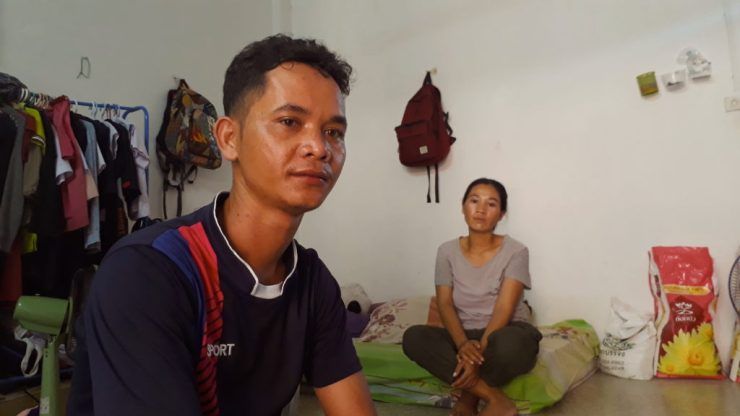
Vietnamese embassies in both Thailand and Cambodia refused to speak with Luat Khoa about the situation of the Montagnards. In Thailand, the embassy didn’t respond to our emails, faxes or phone calls. In Cambodia, a staff member named Ngoc informed us that he had no information about the status of the Montagnards in Phnom Penh, while the Politburo officer said Ngoc was the only one who could answer our questions.
The Montagnard refugees don’t speak English or Thai and very little Vietnamese. As a result, it takes them much longer to go through UNHCR procedures to obtain refugee status; after that, they have to wait for approval from a third country to be re-settled. The chance of resettling is uncertain, and nobody is sure what the future will be like.
Jennifer Harrison, UNHCR spokeswoman in Bangkok, said she could not reveal the total number of Montagnards who are applying for refugee status at UNHCR. She said UNHCR is doing its best to help refugees.
She said: “UNHCR consistently advocates that refugees and asylum seekers – having been confirmed or claimed to be in need of international protection – cannot be returned to their countries of origin according to the principle of non-refoulement, which prevents states from expelling or returning persons to a territory where their life or freedom would be threatened.”
For hundreds of years the Montagnards have depended upon the forests to earn their living and to survive. It’s said that the Montagnards preserved the forests of the Central Highlands to serve the never-ending needs of the Kinh people – the majority of Vietnam’s population. The beds the Kinh people lie on and the chairs they sit on likely come from forests in the Central Highlands.
The Montagnards sacrificed their own fertilized lands to welcome immigrants from the north when the country was divided into two regions in 1954. And they did this again when the lowlanders moved to the new economic zones on the order of the government in a move to deal with population growth and unemployment in cities after 1975.
The Montagnards I met in Thailand said that they had been under surveillance by the Vietnamese government back in the villages in the Central Highlands. First they were not allowed to follow their Protestant beliefs and then they lost their lands.
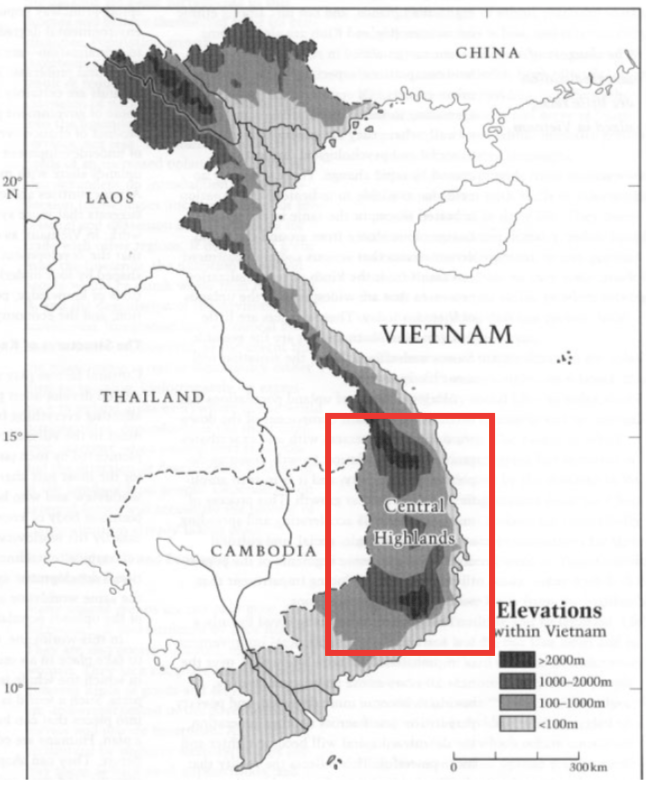
The Central Highlands is no longer a mysterious land when native customs and customary laws continue to be abolished by the government.
“When I was a child, I heard from teachers and the commune people’s committee that praying for rain, buffalo stabbing and other traditional practices were considered backward customs and superstition”, said Nay Them. “They asked the village elders to abandon these ancient customs”.
People eliminated costly rituals and men stopped smoking and drinking once they started to follow Protestantism. And so it was strange in the early 2000s when the government asked the people to restore their traditional customs. Between 2000 and 2004, the government wanted to limit the number of Protestants and so sought to restore these old customs, which were anathema to their religious beliefs.
“They said that these were the original customs of the Central Highlands, and that following Roman Catholicism and Protestantism were following French and American customs,” said Nay Them. He had witnessed the police take away Bibles away from people and beat them, but he did not understand why they did it.
Under strict controls by the local authorities, Nay asked his community to focus on praying at the beginning of the month, but it was also very difficult. At the beginning of the month, the villagers secretly prayed together at the leader’s house. Every Sunday, the police would come and check all the houses. If they found people praying, they would force them to go to the police station. Police said that this religion was not allowed, especially when the people gathered and prayed at the same place.
“I went to the public church but what I got was contemptuousness,” said Nay Them. “They also discriminated against me for advocating against the government”.
Pastor Than Van Truong, who helped some Montagnard families cross the border to Thailand, said that in the 2000s the number of house Protestant groups in the Central Highlands increased sharply. These groups paid much interest to human rights as the local government had been discriminating against them regarding administrative procedures and land disputes. The people depended on their religious affiliations to share their concerns about such issues.
There are many Protestants like Nay in the Central Highlands who also need to pray at home.The number of Protestants in the Central Highlands increased by 432% from 1975 to 1999, to a total of 228,618 followers.
The Protestants in the Central Highlands have long been regarded as a threat to the Communist regime. In 1999, former Prime Minister Phan Van Khai, along with Nguyen Tan Dung, one of the deputy ministers responsible for the Central Highlands, established the 184 Steering Committee (the Committee for the Guidance of Correct Thought) to suppress Protestants in the Central Highlands and the northwest.
“When we pursued and drove away FULRO (the United Front for the Liberation of Oppressed Races) and the rebellious groups, evangelical churches in some places had to be closed….”, according to a committee statement describing its successful effort to control Protestantism in the Central Highlands. “After a few years of taking measures against Protestantism, such as suspending religious activities of Protestantism, dismissing the governing board of deacons, re-educating the clergy in detention camps, closing churches, dealing forcefully with unauthorized religious activities and agitating for the masses to defect from their own religions in fact, Protestant activities have been narrowed and prevented from operating in a normal way”
FULRO was an armed movement fighting for independence for indigenous people in Vietnam. They fought against both the regime of the Republic of Vietnam and the Viet Cong. After hiding themselves in the forests in Cambodia, FULRO was disbanded and its members were resettled in the United States at the end of 1992.
Neil L. Jamieson, Le Trong Cuc, and A. Terry Rambo – three researchers – predicted in a special report published in 1998 that there might be some crisis in the area, and this prediction became true between 2001 and 2008.
“Many upland people began to see themselves as poor and backward. They felt inferior to lowlanders, to foreigners, and even to some other minority groups”, the researchers wrote in their report. “Lacking money, food, access to natural resources and public services [education, health care, information], they were on the edge of losing their most precious resources of all: self-confidence and self-respect. It was not just that they lacked money and access to daily necessities. After all, the uplands have always been economically worse off than the lowlands. The problem is that the people gradually became self-conscious about their economic status.”
In early 2001, thousands of Montagnards paraded from their villages to the government center in the region for a protest. The government then issued a curfew order, cut off the telephone lines, mobilized tanks and mobilized army forces to eliminate the massive protest.
In order to alleviate the situation, author Nguyen Ngoc suggested former Prime Minister Nguyen Tan Dung, who was in charge of the Central Highlands, to revise land ownership policies, but he refused to do this. Dung sent the protesters work as forced laborers in re-education camps and prisons.
Since the 2001protests, the government has claimed that FULRO and its Degar Protestantism, a religious organization that unites the Montagnard Protestants to stand up for their rights, was behind uprisings and activities that were opposed to the government in the Central Highlands. Until now, many Montagnards continue to be persecuted as the government thinks they have links to these organizations.
In the refugee camp in Bangkok , I had tried to find out the connection between the refugees and Degar Protestantism but the people I spoke to claimed to have no idea about it. Pastor Than Van Truong said that he had asked the Montagnard pastors to get more information about Degar Protestantism but again no one knew anything about it.
Kpă Hung, a 44-year old Bana man, who was arrested for the third time in 2004, when he was sentenced to 12 years in prison, lost his faith in the government. “On the protest day, I sought a transparent dialog between the government and the people,” he said. “But they neither admitted their faults nor changed their minds”.
Meanwhile, Prime Minister Dung has continued to push harsh policies in the Central Highlands during his two succeeding terms as prime minister.
A former UN staff member in Vietnam told Luat Khoa that the state considered the Central Highlands “very sensitive” in terms of religious and ethnic issues.The United Nations in Vietnam could only intervene in the Central Highlands indirectly through Universal Periodic Reviews (UPR) and visits by the UN special rapporteur.
Land issues did not improve after a series of misguided policies in the Central Highlands, such as hydropower projects, which allocated most of the land to agroforestry farms and land in forest areas to Vietnamese and other migrated minority groups from the north. The Montagnards didn’t received any benefits. The Land Law issued in 2003 and 2013 did not solve the land problem for indigenous highlanders.
An anonymous expert with a decade of experience working on forest lands said that the land issue in the Central Highlands was extremely complicated. He said that land disputes in some areas of the regions accounted for more than 90% of complaints. Land disputes had been taking place among the Montagnards, the government, businesses, the Kinh and other ethnic migrants.
The expert said that the Montagnards continue to face many disadvantages. “For example, they didn’t have sufficient legal evidence to fight for their land”, he said. “And furthermore, the government did not provide adequate compensation for the indigenous people who lost their land to the government. Their land was not protected by customary laws and the people didn’t even have the right to agree on prices.”
The expert said that those indigenous people who didn’t want to fight, moved closer to natural forests, but they once again had to confront the government.
He added that the vicious cycle of land loss, land shortages, land disputes and encroachment was a result of multiple factors. “For instance, forest land for ethnic people to cultivate was worth approximately 15 million dong/ha/year. But if they switched to trading crops, the profit would rise to 80-120 million dong/ha/year,” he said.
The Montagnard families whom I met in Bangkok told me that they had little to no space available for use. They didn’t have enough capital to grow high-value crops so they tried to live day by day.
In an old house above the small canal, I found a group of Jrai women painting scenes of their unforgettable escapes from Vietnam. While there, I met Jen, a 20-year-old Jrai girl who had fled to Bangkok the year before. She spoke a little English and the Jrai language, and she was working hard as a translator for an American artist who was coming to the camp every weekend to provide painting therapy to her mom and others in the camp.
Jen’s mother was painting a scene about how she lost her two-year daughter after they passed through the immigration check-point at the border. While she hid herself under the bus she let her daughter go with the guide through the check-point. They reunited two days later in Laos and continued their escape to Thailand.
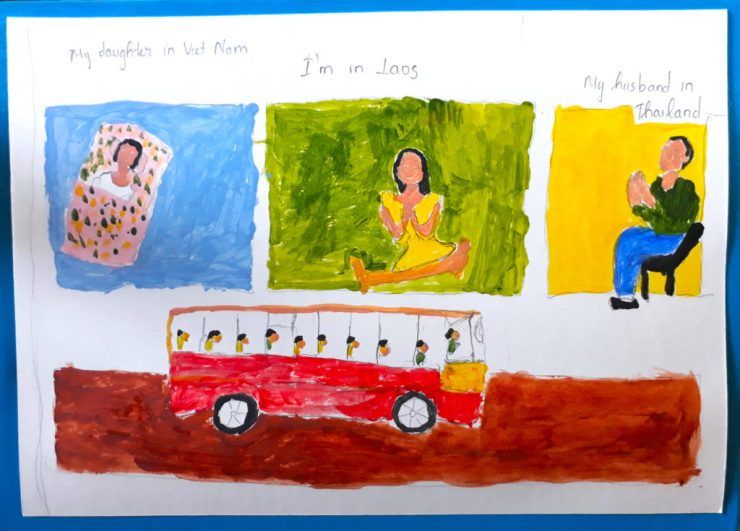
When her mother fled to Thailand, Jen was still a child in the Central Highlands. “My two younger sisters and I had to take care of ourselves. We were very scared right after our parents had left home….” she said. “We cried so much, but we accepted the reality after two or three months, and we tried to be stronger for the next three years”.
Jen stuttered when describing the time her mother tried to escape from the police after being forced to provide her husband’s contact in Bangkok. “My mother didn’t say that she was about to go to Thailand,” said Jen. “She told me to stay at home and take care of my two younger sisters; then she walked away with my youngest sibling.”
“When I turned 18-years-old they came to my house and asked if my father had called me or if I had contacted my parents,” she said. “I dared not to speak any words. I was afraid that they would arrest me.”
Jen said there were many similar cases in her village. “the police arrested the family members and beat them at the police station”, she said. “When they came to see us, we gathered at the corner and I tried in fear to protect my sisters with my arms.”
“Once again, the police ordered me to come to their office. They threatened that if I did not call my parents and urge them to return home, I would be put into prison,” she said. “They asked me to give them my parents’ contact information. I answered that I didn’t have any. I was so scared that I only spoke a few words and then burst into tears. They yelled at me. They beat me up. They slapped my face and head. Each night, they sent some people to investigate our house.”
Jen later decided to give 10 million dong (about US$430) to the man next door to send her three sisters to Thailand. The money was from her grandmother and her job.
“At 3:00 am that day, the man took the three of us to Saigon [Ho Chi Minh City”, she said. “At the Mien Dong Bus Station, he told us to wait until someone picked us up. Finally, a man came and forced us to walk quickly. We jumped into a small car with many people, I had no idea what would happen next. We walked through the river and the jungle. After three days, we arrived in Thailand”.
To escape the threat of Vietnamese police, children like Jen’s sisters had to go with strangers and travel in dangerous cars with the hope that they would later be able to reunite with their parents. The children faced the danger of being kidnapped, sold to brothels, or forced to work as slaves.
For the past two decades, only international organizations abroad have been monitoring the situation in the Central Highlands, but they are struggling to get accurate information due to government restrictions in the area.
Many NGOs remain silent when asked about the situation in the Central Highlands for fear of government retaliation. World Vision Vietnam, a Christian organization that has helped children in Vietnam for 30 years, declined to comment on the situation of children in persecuted Protestant families in the Central Highlands.
Phil Robertsonbelieves that the Vietnamese government is trying to cover up its human rights violations in the Central Highlands.
“The problem is Vietnam sees its abusive treatment of the Montagnards as an internal matter and does everything it can to keep the international community out of this,” said Robertson. “But in reality, what Vietnam is doing to the Montagnards clearly violates international human rights, and so the international community is quite right to be concerned about this.”
Robertson added that Hanoi severely restricts access to the highlands to keep diplomats and human rights monitors like HRW, UN officials, and international media out of the picture, so it is sometimes difficult to get up-to-date information about what is happening there.
“By making it difficult to get information from the area,” he said, “Vietnam hopes to make the world forget its blatant discrimination and rights abuses against the Montagnards.”
“Over the past 20 years, the Montagnard people have gone through hard times, especially during crackdowns by the authorities after protests, but these communities are strong and they continue to persevere in the face of government repression,” he said.
A Ga, a Protestant from the Montagnard Evangelical Church Of Christ, has resettled with his family in the United States after seeking asylum in Thailand for six years. However, he is still on watch the list of the Ministry of Public Security in Vietnam and so dares not go back home. In July 2019, he was surprisingly chosen to meet U.S. President Donald Trump at the White House along with other survivors of religious persecution in the world.
A Ga said that his case caught the attention of U.S. government because he was arrested by Thai police in January 2018. He said he believes the Vietnamese government was involved in his arrest. After three months in detention, he and his family were taken to the Philippines and then flown to the United States. Now he has begun a new life in North Carolina – the place where many Montagnards families have resettled in the past.
Meanwhile, in the refugee camps in Thailand and Cambodia, Montagnard refugees continue to live desperate lives, not knowing what the future holds for them.
While you are reading this article, somewhere on the desolate borders between Vietnam, Cambodia and Laos, there are likely some frightened Montagnard families making the harrowing trip across the border, running away from the Vietnamese government in the hope of finding a new and better life.
Vietnam's independent news and analyses, right in your inbox.